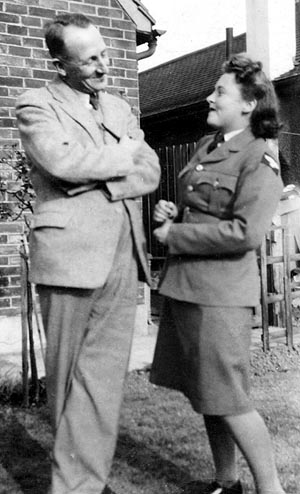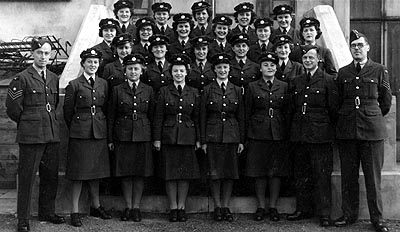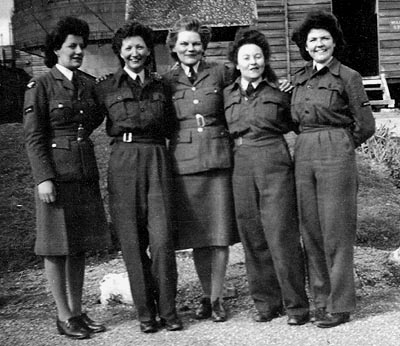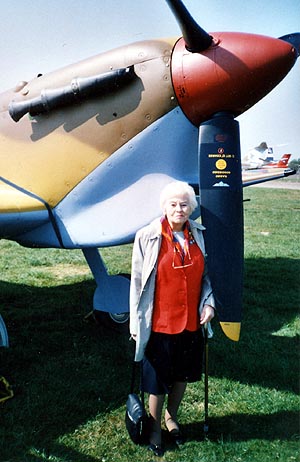Without the
backup of the vast army of ground personnel behind them, the
valiant pilots who went to war in the sky could not have left
terra-firma, and few were as vital to the smooth running of the
RAF than the Women's Auxiliary Air Force, or WAAF's.
As you will
read in the following piece, Audrey Morgan's time as a WAAF took her to such
notable RAF stations as Hornchurch and Hawkinge, with various
hairy moments along the way, and provides valuable insight into
the vital work that she and her comrades performed.
When her
husband John died some years ago, Audrey decided that it would
not mean the end of her association with the Spitfire Society,
and she has continued as a member of our Region ever since. A
stalwart supporter of visits and events, Audrey may invariably
be found working hard on our Sales Stand at air shows helping to
raise the vital funds upon which our Society depends. With her
winning smile, open manner and great charm, Audrey is one of our
dearest and most admired supporters.
P.W. Feb 2008
We start Audrey's account when
she was called up in the Spring of 1942, thus ending her "easy
life" with a major Insurance Company which had evacuated its
staff from London to Torquay. The picture shows Audrey at home
with her Uncle at that time.

"I managed to dodge the Army
but was unable to get into the WRENs, my first choice (the
uniform of course), due no doubt to the obvious snob attitude at
the time. I was pleased to be accepted into the WAAFs as my
father was in the RFC (47 Squadron) in the 1st World War, and I
had relatives serving in the RAF during the present crisis.
The first month at Innesworth,
Gloucester was routine; square bashing, billet cleaning,
inspections and jabs which thankfully passed with no major
disasters. I was due to be trained as a 'Plotter’ but had a rush
of blood to the head and felt that as I had such a cushy war up
until then that I should train for a job where I at least got my
hands dirty so I re-mustered to Equipment Assistant. In
retrospect all turned out well but I could have made a bad
mistake and ruined my time in the Services. Training was at
Bridlington and the course lasted two months. I passed well,
became an LACW and was asked to stay as an Instructor with
promotion to Corporal. I refused as I was keen to get to a
Station and start working at my chosen Trade. Fortune smiled and
I was sent to RAF Hornchurch (11 Group) where I was amongst
Spitfires, and my life-long interest in that wonderful aircraft
was thus kindled. I was certainly granted my wish to get dirty
as I was put in charge of the petrol and oil store! The next
eleven months were spent climbing on lorries and bowsers,
supervising the deliveries and insuring the correct octanes went
into the right tanks, dipping them daily and working out levels,
plus dispensing petrol and oil to the MT Section. Quite a
responsible job for an inexperienced WAAF but one which I
thoroughly enjoyed.

My next posting was to RAF
Hawkinge (still 11 Group & Spitfires) where I stayed almost 2
years working in almost every section including a stint in
charge of blankets and laundry!! Hawkinge was a great Station to
be at and we had our share of excitement in "Hell Fire Corner"
including shelling from Calais. I missed being badly hurt the
night the Sergeants Mess was hit and a large piece of concrete
was dislodged from our billet ceiling, falling on my bed.
Luckily as it was a cold night I had my head towards the fire so
it fell just short of my feet! There was much activity with V1’s
also and once again I had a narrow squeak when a V1 was downed
nearby, blowing me off a packing box whilst checking u/s
equipment outside the Stores. Obviously only the good die
young! Just before V.E. Day I was sent to RAF Coltishall for
four months before returning to Hawkinge until the end of 1945.

My last months were divided
between a short posting to Padgate, whence to Cardington until
the Spring of 1946 and finally to Melksham from where I was
demobbed in June of that year. Cardington was the most
interesting of my last three postings, but Melksham the most
nostalgic as it was there that I met Johnny. Searching my mind
to write this article has stirred so many memories and made me
realise how fortunate I was to be even minutely involved at such
a momentous time in our history."

The Spitfire Society Interview with Alex Henshaw can be found here:

& the previous interview with Bert Harman can be found here:



